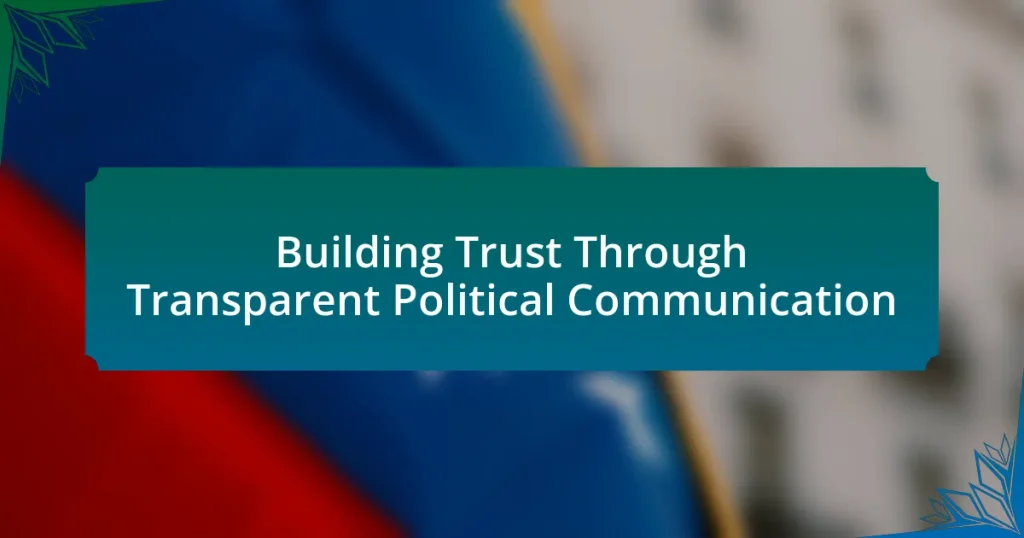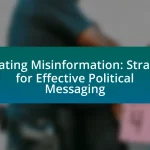Building trust through transparent political communication is a critical practice that involves openly sharing information, intentions, and decision-making processes between political entities and the public. This article explores how transparency fosters trust, enhances public perception of political figures, and encourages civic engagement, supported by research indicating that higher transparency correlates with increased public trust and participation in democratic processes. Key elements of transparent communication include clarity, honesty, accessibility, and accountability, while challenges such as misinformation and political polarization hinder its effectiveness. The article also outlines strategies for overcoming these challenges, emphasizing the role of technology and citizen engagement in promoting transparency and accountability in governance.
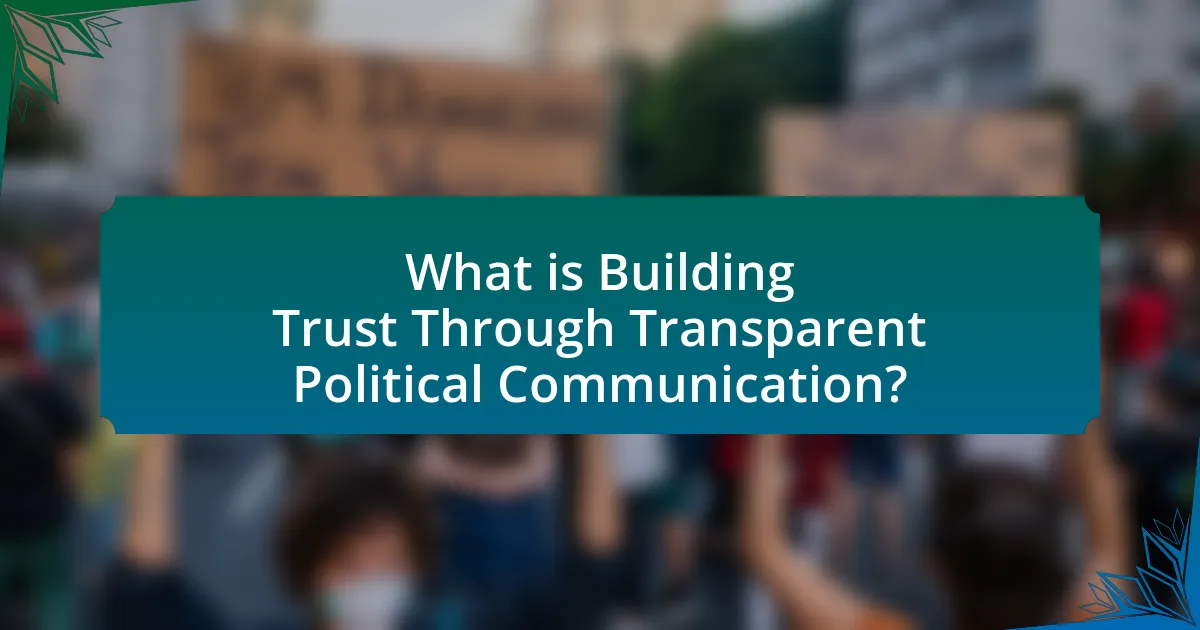
What is Building Trust Through Transparent Political Communication?
Building trust through transparent political communication involves the practice of openly sharing information, intentions, and decision-making processes between political entities and the public. This approach fosters accountability and encourages citizen engagement, as evidenced by studies showing that transparency in government actions can lead to increased public trust and participation in democratic processes. For instance, research conducted by the World Bank indicates that countries with higher levels of transparency experience greater citizen trust in government institutions, which is crucial for effective governance and social cohesion.
How does transparent political communication foster trust?
Transparent political communication fosters trust by providing clear, honest, and accessible information to the public. When political leaders share their intentions, decisions, and the rationale behind them transparently, it reduces uncertainty and builds credibility. For instance, studies have shown that when governments openly communicate about policies and their impacts, citizens are more likely to perceive them as trustworthy. A 2020 survey by the Pew Research Center indicated that 70% of respondents felt more trust in leaders who communicated openly about challenges and decisions during crises. This openness not only enhances accountability but also encourages civic engagement, as citizens feel informed and valued in the democratic process.
What are the key elements of transparent political communication?
The key elements of transparent political communication include clarity, honesty, accessibility, and accountability. Clarity ensures that messages are easily understood, while honesty involves providing truthful information without deception. Accessibility means that information is readily available to the public, allowing for informed participation. Accountability requires political figures to take responsibility for their actions and decisions. These elements are essential for fostering trust between political entities and the public, as evidenced by studies showing that transparency in communication correlates with increased public trust in government institutions.
How does transparency influence public perception of political figures?
Transparency significantly enhances public perception of political figures by fostering trust and credibility. When political figures openly share information about their decisions, policies, and actions, it reduces skepticism and promotes a sense of accountability among the electorate. Research indicates that transparency can lead to increased approval ratings; for instance, a study published in the Journal of Politics found that voters are more likely to support leaders who communicate openly about their governance processes. This correlation underscores the importance of transparent communication in shaping favorable public opinions and reinforcing democratic engagement.
Why is trust important in political communication?
Trust is crucial in political communication because it fosters credibility and encourages public engagement. When citizens trust their political leaders and institutions, they are more likely to participate in democratic processes, such as voting and civic discussions. Research indicates that high levels of trust in government correlate with increased political participation; for instance, a study by the Pew Research Center found that 70% of individuals who trust their government are more likely to vote compared to only 30% of those who do not. This relationship underscores the importance of transparent communication, as it builds the foundation for trust, enabling effective governance and societal cohesion.
What role does trust play in democratic governance?
Trust is fundamental to democratic governance as it fosters citizen engagement and compliance with laws. When citizens trust their government, they are more likely to participate in the democratic process, such as voting and civic activities, which enhances the legitimacy of the political system. Research indicates that high levels of trust in government correlate with increased public support for policies and greater adherence to regulations, as seen in studies conducted by the Pew Research Center, which found that trust in government significantly influences public cooperation during crises, such as the COVID-19 pandemic. Thus, trust acts as a crucial mechanism that underpins the effectiveness and stability of democratic governance.
How does trust impact voter engagement and participation?
Trust significantly enhances voter engagement and participation by fostering a sense of confidence in the electoral process and political institutions. When voters trust that their voices matter and that the political system operates fairly, they are more likely to participate in elections. Research indicates that higher levels of trust in government correlate with increased voter turnout; for instance, a study by the Pew Research Center found that individuals who express trust in government are 20% more likely to vote compared to those who do not. This relationship underscores the importance of transparent political communication, as it builds trust by ensuring that voters are informed and feel included in the democratic process.
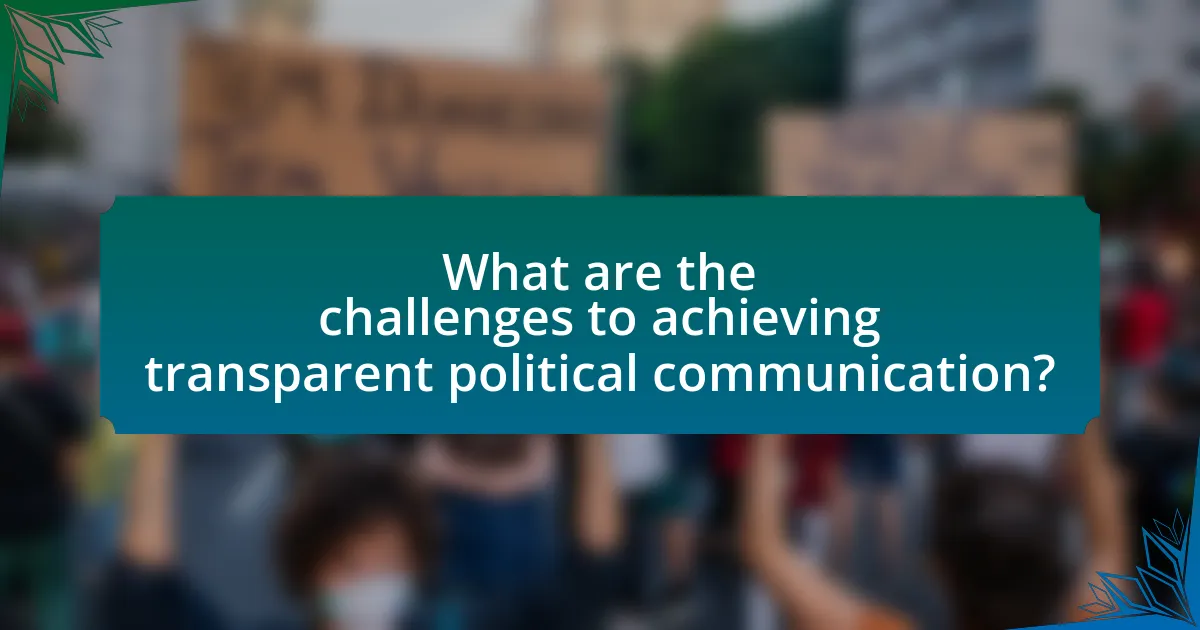
What are the challenges to achieving transparent political communication?
Achieving transparent political communication faces several challenges, including misinformation, lack of access to information, and political polarization. Misinformation undermines trust and creates confusion among the public, as seen during elections where false narratives can spread rapidly through social media. Lack of access to accurate information can hinder citizens’ ability to engage meaningfully in political discourse, often resulting from bureaucratic barriers or inadequate communication strategies by political entities. Political polarization further complicates transparency, as individuals may interpret information through biased lenses, leading to distrust in messages from opposing parties. These challenges collectively impede the establishment of a transparent political environment necessary for building trust.
What obstacles do politicians face in being transparent?
Politicians face several obstacles in being transparent, primarily including the fear of backlash, the complexity of information, and the influence of political interests. The fear of backlash arises from potential public criticism or loss of support, which can deter politicians from disclosing full information. The complexity of information often makes it challenging to communicate policies and decisions clearly, leading to misunderstandings or misinterpretations. Additionally, political interests, such as party loyalty or the need to protect sensitive information, can hinder full transparency. These factors collectively create an environment where politicians may prioritize strategic communication over openness, impacting public trust.
How do misinformation and disinformation affect transparency?
Misinformation and disinformation significantly undermine transparency by obscuring the truth and creating confusion among the public. When false information is disseminated, it leads to a lack of clarity regarding important issues, making it difficult for individuals to make informed decisions. For instance, a study by the Pew Research Center found that 64% of Americans believe that misinformation has a major impact on their ability to understand current events. This erosion of trust in information sources ultimately hampers effective communication and accountability in political contexts, as citizens become skeptical of legitimate information.
What are the consequences of a lack of transparency in political communication?
A lack of transparency in political communication leads to diminished public trust in government institutions. When citizens perceive that information is being withheld or manipulated, they are more likely to become skeptical of political motives and decisions. This skepticism can result in increased political apathy, lower voter turnout, and a disengaged electorate, as evidenced by studies showing that transparency correlates with higher levels of civic participation. Furthermore, a lack of transparency can foster an environment conducive to corruption, as officials may exploit the absence of scrutiny to act in self-interest rather than the public good. Research by the World Bank indicates that countries with higher transparency levels experience better governance outcomes, reinforcing the critical importance of openness in political discourse.
How can political entities overcome these challenges?
Political entities can overcome challenges in building trust through transparent communication by implementing clear, consistent messaging and engaging with constituents through multiple channels. This approach fosters openness and accountability, which are essential for trust. For instance, studies show that transparency in government operations can lead to increased public trust; a 2019 report by the OECD found that countries with higher levels of transparency experienced greater citizen satisfaction and trust in public institutions. By actively soliciting feedback and addressing concerns, political entities can further enhance their credibility and strengthen relationships with the public.
What strategies can be implemented to enhance transparency?
To enhance transparency, organizations can implement strategies such as regular public reporting, stakeholder engagement, and the use of technology for open data sharing. Regular public reporting involves consistently providing updates on activities, decisions, and financials, which fosters accountability and trust. Stakeholder engagement encourages dialogue with the community, allowing for feedback and input, which can improve decision-making processes. The use of technology, such as online platforms for data sharing, enables easy access to information, making it more accessible and understandable for the public. These strategies have been shown to improve public perception and trust, as evidenced by studies indicating that transparency initiatives lead to increased citizen satisfaction and engagement in governance.
How can technology aid in promoting transparent communication?
Technology can aid in promoting transparent communication by facilitating real-time information sharing and enhancing accessibility to data. Digital platforms, such as social media and dedicated communication apps, allow for immediate dissemination of information, enabling stakeholders to receive updates and engage in discussions promptly. For instance, during political campaigns, candidates can use social media to communicate their policies directly to the public, bypassing traditional media filters. Research from the Pew Research Center indicates that 69% of adults in the U.S. use social media, highlighting its role in fostering direct communication. Additionally, tools like blockchain can ensure data integrity and authenticity, further reinforcing trust in the information shared.
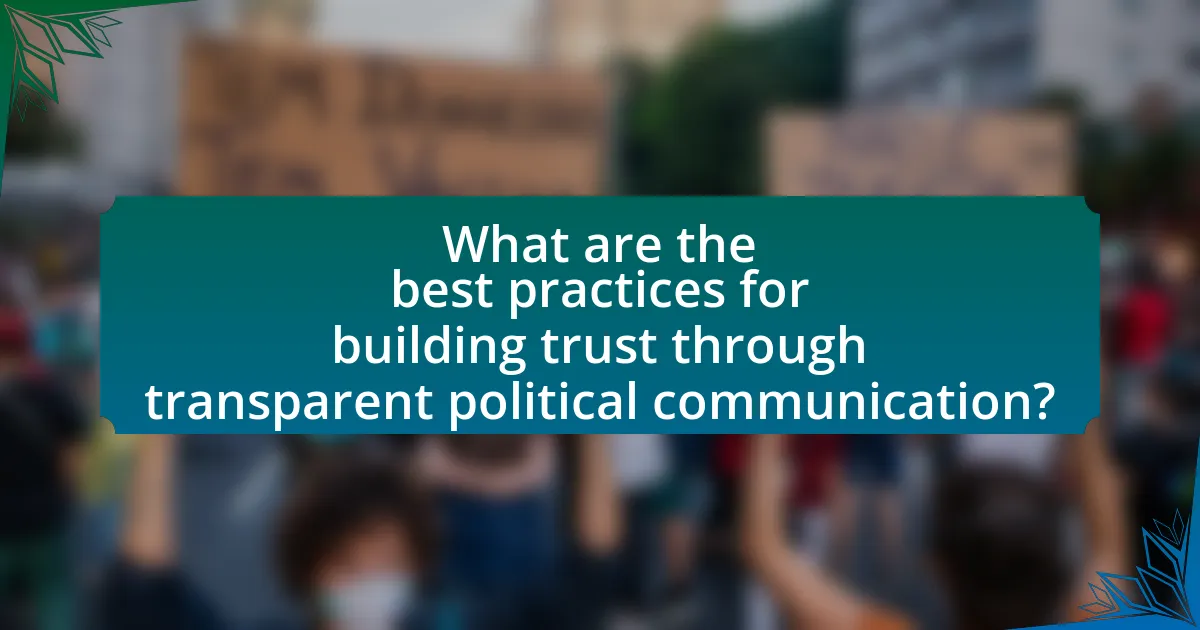
What are the best practices for building trust through transparent political communication?
The best practices for building trust through transparent political communication include consistent messaging, openness about decision-making processes, and active engagement with constituents. Consistent messaging ensures that political leaders convey clear and coherent information, which helps to avoid confusion and misinformation. Openness about decision-making processes fosters a sense of inclusion and accountability, as seen in the practices of successful leaders who share the rationale behind their policies. Active engagement with constituents, through town halls or social media, allows for direct dialogue and feedback, reinforcing trust. Research indicates that transparency in communication correlates with higher levels of public trust, as demonstrated in studies by the Pew Research Center, which found that 70% of Americans believe that transparency in government leads to greater trust in political institutions.
What methods can politicians use to communicate transparently?
Politicians can use methods such as open forums, social media engagement, and regular press briefings to communicate transparently. Open forums allow direct interaction with constituents, fostering a two-way dialogue that enhances trust. Social media platforms enable politicians to share information quickly and respond to public inquiries in real-time, increasing accessibility and accountability. Regular press briefings provide structured opportunities for politicians to present updates and answer questions, ensuring that information is disseminated consistently and accurately. These methods have been shown to improve public perception and trust in political figures, as evidenced by studies indicating that transparency in communication correlates with higher levels of public trust in government institutions.
How can regular updates and open forums enhance transparency?
Regular updates and open forums enhance transparency by providing consistent and accessible information to stakeholders, fostering an environment of trust and accountability. Regular updates ensure that all parties are informed about ongoing developments, decisions, and changes, which reduces misinformation and speculation. Open forums allow for direct communication between decision-makers and the public, enabling questions, feedback, and discussions that clarify intentions and actions. Research indicates that organizations that prioritize transparency through such practices experience higher levels of public trust and engagement, as evidenced by a 2020 study published in the Journal of Public Administration Research and Theory, which found that transparency initiatives significantly improve citizen satisfaction and trust in government institutions.
What role does social media play in transparent political communication?
Social media serves as a crucial platform for transparent political communication by enabling direct interaction between politicians and the public. This immediacy fosters accountability, as elected officials can share information and respond to constituents in real-time. For instance, studies show that politicians who actively engage on platforms like Twitter and Facebook can enhance their perceived transparency, as they provide updates and clarify their positions on issues directly to their audience. Furthermore, social media allows for the dissemination of information without traditional media filters, empowering citizens to access diverse viewpoints and engage in discussions, which is essential for a healthy democratic process.
How can citizens contribute to fostering transparency in politics?
Citizens can contribute to fostering transparency in politics by actively engaging in civic activities such as attending town hall meetings, participating in public forums, and utilizing platforms for open government data. These actions enable citizens to hold elected officials accountable and demand clarity on governmental processes. For instance, a study by the Pew Research Center found that 70% of Americans believe that public participation in government leads to better decision-making. By advocating for transparency initiatives, such as the Freedom of Information Act, citizens can ensure that information is accessible and that political processes are open to scrutiny.
What actions can citizens take to hold politicians accountable?
Citizens can hold politicians accountable by actively participating in the democratic process, such as voting, attending town hall meetings, and engaging in advocacy. By voting, citizens express their preferences and influence political outcomes, as evidenced by the fact that voter turnout in the 2020 U.S. presidential election reached 66.8%, the highest rate since 1900, demonstrating the power of citizen engagement. Attending town hall meetings allows citizens to directly question politicians about their policies and decisions, fostering transparency. Additionally, engaging in advocacy through petitions or social media campaigns can amplify citizen voices and pressure politicians to respond to public concerns. These actions collectively empower citizens to demand accountability from their elected officials.
How can civic education promote a culture of transparency?
Civic education can promote a culture of transparency by equipping citizens with the knowledge and skills necessary to engage critically with governmental processes and hold public officials accountable. This education fosters an understanding of democratic principles, encouraging individuals to demand transparency in decision-making and policy implementation. Research indicates that countries with robust civic education programs, such as Finland, exhibit higher levels of public trust in government and lower levels of corruption, demonstrating the effectiveness of informed citizenry in promoting transparency.
What are the practical steps for implementing transparent political communication?
To implement transparent political communication, political entities should adopt the following practical steps: establish clear messaging, engage in active listening, utilize multiple communication channels, ensure timely dissemination of information, and foster an open dialogue with constituents. Clear messaging involves articulating policies and decisions in straightforward language, which enhances understanding and reduces misinformation. Active listening allows political leaders to gauge public sentiment and respond appropriately, thereby building trust. Utilizing multiple communication channels, such as social media, press releases, and town hall meetings, ensures that information reaches diverse audiences effectively. Timely dissemination of information is crucial, as it prevents speculation and promotes accountability. Finally, fostering an open dialogue encourages feedback and participation from the public, reinforcing the commitment to transparency. These steps are supported by studies indicating that transparency in communication leads to increased public trust and engagement in political processes.
